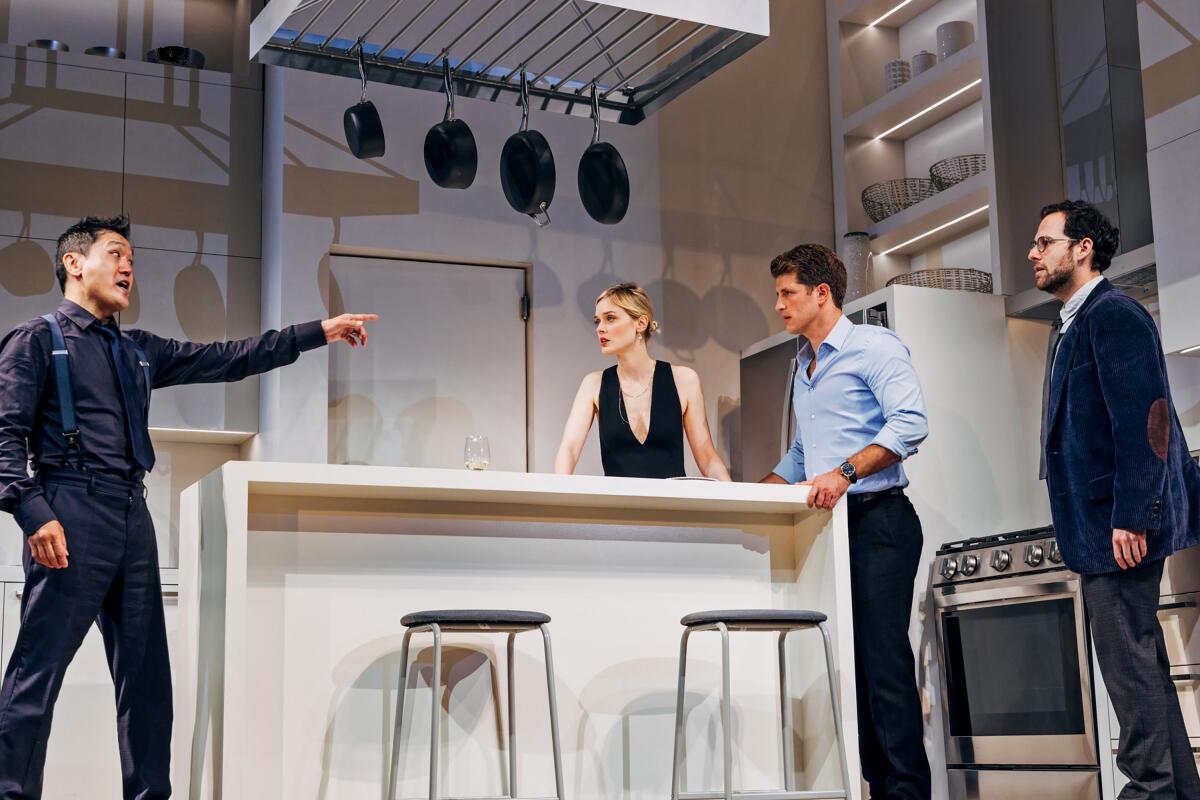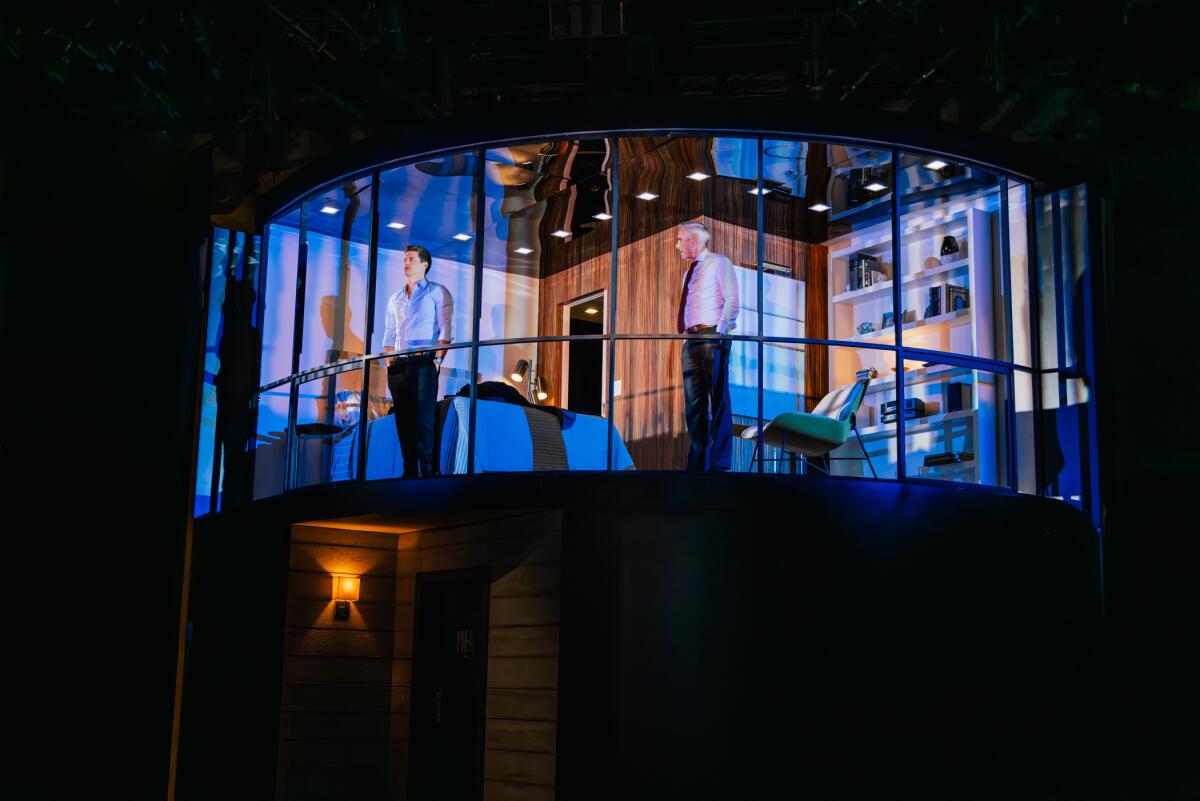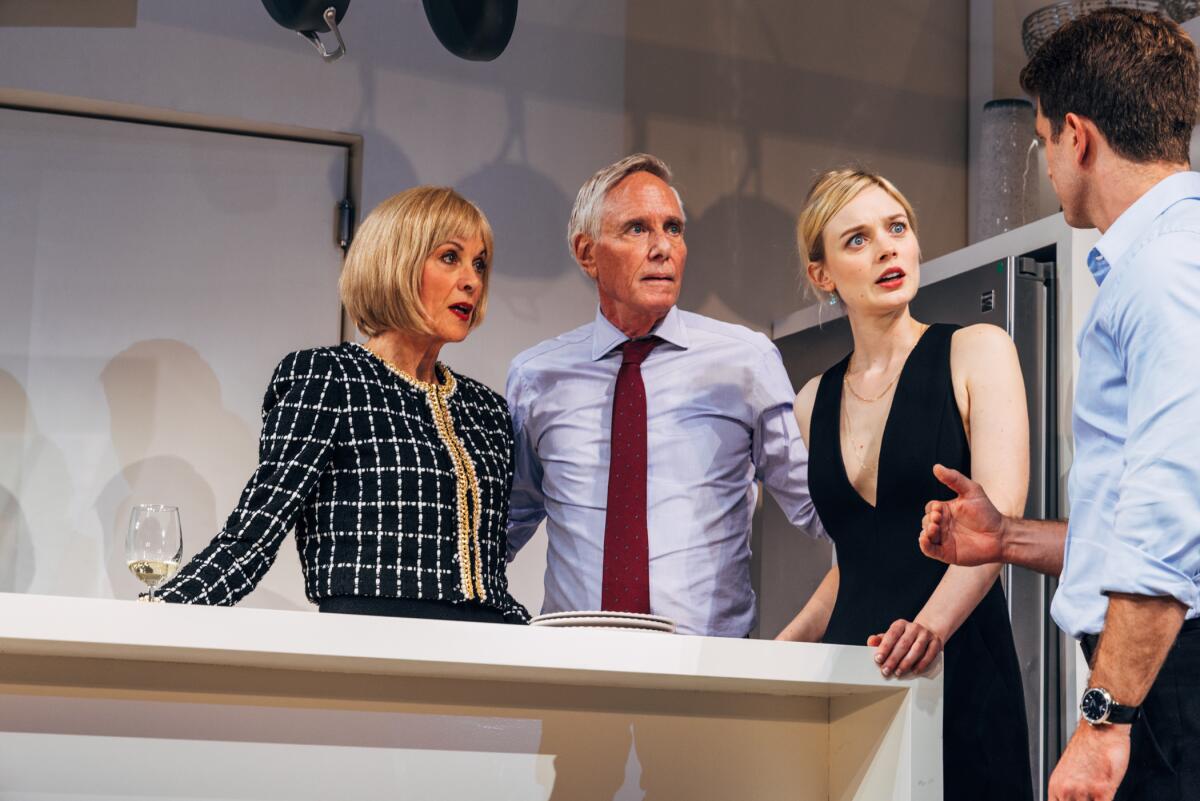Review: ‘The Engagement Party’s’ decor is sharper than its wit

- Share via
A Park Avenue duplex, brought to Instagram-able life by scenic designer Alexander Dodge, is the true star of “The Engagement Party,” Samuel Baum‘s mildly amusing comedy about the secrets and deceptions lurking just below the surface of the most enviable, high-achieving lives.
Katherine (Bella Heathcote) and Josh (Jonah Platt) are celebrating their engagement at their thirst-trap of a home. The soiree that will be attended by Katherine’s old-money WASP parents and a few of the couple’s close friends from — where else? — Harvard. As Katherine frets over the hors d’oeuvres and Josh reassures his beloved that her father’s preferred drink is well-stocked, a picture is painted of romantic bliss in a fairy tale New York setting.
Almost too good to be true, you might think to yourself with an inner sneer.
Josh, a hedge fund prince, is riding high on yearly bonuses that for many would be the equivalent of a winning lottery ticket. But unlike Katherine, he didn’t come from wealth. He grew up in a scrappy section of Brooklyn, and though he’s proud of his working-class Jewish background, he’s a little disturbed to learn that Johnny (Brian Patrick Murphy), an old buddy from Canarsie with the manners of a bulldozer, is making a special trip just to be at the engagement party.

Katherine loves the challenge of arranging, whether it’s a table setting or a group of party guests with one F-bombing wild card. Everything for her has to be just so, which in drama is a cue for mayhem to be waiting in the wings.
“The Engagement Party,” which opened Thursday at the Geffen Playhouse under the polished direction of Tony-winner Darko Tresnjak, who staged the play’s 2019 premiere at Hartford Stage, has been compared to Yasmina Reza’s comedy “God of Carnage” for the way it exposes the ruse of bourgeois civility. But Baum is too cautious a writer to let the brutality get out of hand. A decorous timidity keeps aggression in check. In the heat of fury, a character might deliver a shove, but don’t expect a punch.
One source of restraint is the sitcom friendliness of the writing. Each character has his or her obvious social tag. The clashes of personalities are mathematically developed. And the plot is steadily ratcheted up to keep this 80-minute play from souring like a vegetable dip left out too long.
The neat and punctual craftsmanship may be soothing to an audience conditioned by television to appreciate familiar formulas. But without sufficient threat, a play can cut only so deep.
To his credit, Baum doesn’t pursue the more obvious conflicts he sets up. Johnny, a Brooklyn bull in a Manhattan china shop, is positioned to be the agent of chaos who upends the lavish affair with his clumsy outer-borough candor. But Josh’s oldest friend turns out to be his most stalwart.

Harvard friend Alan (Mark Jacobson), a Columbia University philosophy professor who is still recovering from the long subway ride to the Upper East Side from Park Slope, finds excessive wealth to be morally objectionable in a world rife with poverty and hunger. But he refuses to take the bait from Conrad (Richard Bekins), Katherine’s effete investment banker dad, who seems to be spoiling for a fight with anti-capitalist crusaders. (Why, I wondered, didn’t they bond over Park Slope’s formidable real estate prices?)
The women, though vaguer, are slightly more intriguing. The details we know about Gail (Wendie Malick, in sharp form), Katherine’s gallerist mother grappling with grave health concerns, and Haley (Lauren Worsham), a medical researcher struggling with depression before and after motherhood, leave many gaps. But it’s a relief to escape the pat qualities of the men.
Katherine, it is suggested, is a pediatrician, though she is given this occupation by a writer who appears to be selecting the attributes of his characters while leafing through a glossy catalog of elite possibilities. “Let’s make this one a god of finance who pulled himself up by his bootstraps and this one an Ivy League academic with the privileged integrity of someone raised by psychiatrist parents,” it’s possible to imagine Baum cogitating at his storyboard while conjuring Josh and Alan into thin existence.
Johnny has the artillery grease on his hand to back up Josh’s remark that he’s between “deployments,” but his military bona fides are as sketchy as Katherine’s medical credentials. The postcard realism (enhanced by Joshua Pearson’s character-accentuating costumes) lulls an audience into suspending disbelief. But the play trades too heavily on the architectural eye candy of its turntable set, which moves from the swank living room to the state-of-the-art kitchen to the upstairs guest bedroom.

The plot hinges on a $300,000 engagement ring that goes missing after it has been passed around the dinner table for ogling. A detective story emerges, with an Agatha Christie assortment of culprits, played out in a connect-the-dots fashion, with stakes that never seem weighty enough. True, Josh and Katherine’s future is on the line, but it’s hard to invest in their designer-label union.
A conflict between Josh and Kai (Brian Lee Huynh), Haley’s husband who works at Josh’s firm and has some built up resentment about money, is meant to dovetail with the play’s more momentous confrontation between Josh and Conrad. But Baum’s scrupulous plotting gets fuzzy. The play wants Josh’s secret involving a past incident with his father-in-law to spring out at the climax like a jack-in-the-box, but the information, already hazily intuited by the audience, is awkwardly integrated into the larger story.
“The Engagement Party” will nevertheless prove entertaining to those who like to sit back and enjoy the surface sparkle. The leads, Heathcote and Platt, are especially alluring as the happy couple forced to confront a snake slithering in their white-glove Eden. They can’t atone for the play’s lack of depth, but they bring truthful particularity and a touch of zest.
As Alan, Jacobson exudes a quick-witted New York authenticity. Worsham, who was nominated for a Tony for her performance in “A Gentleman’s Guide to Love and Murder,” which earned Tresnjak a Tony for his direction, is utterly convincing as an accomplished old college friend muddling through the malaise of compromised adulthood.
Malick, who inhabits Gail’s Southern haughtiness with crisp authority, wields her character’s cane as though it were a general’s baton. What she chooses to know and not know about her marriage determines in large part the comedy’s path.
“The Engagement Party,” appealingly staged, is a diversion you won’t long remember. But it’s also one you probably won’t regret.
Tarell Alvin McCraney, Geffen Playhouse’s new artistic director, discusses the “calling” of theater and his vision for the future of the Westside theater.
‘The Engagement Party’
Where: Gil Cates Theater at Geffen Playhouse, 10886 Le Conte Ave.
When: 8 p.m. Wednesdays to Fridays, 3 and 8 p.m. Saturdays, 2 and 7 p.m. Sundays. Ends Nov. 5
Tickets: $39 to $129 (subject to change)
Info: (310) 208-2028 or www.geffenplayhouse.org
Running time: 1 hour, 20 minutes, with no intermission
More to Read
The biggest entertainment stories
Get our big stories about Hollywood, film, television, music, arts, culture and more right in your inbox as soon as they publish.
You may occasionally receive promotional content from the Los Angeles Times.












